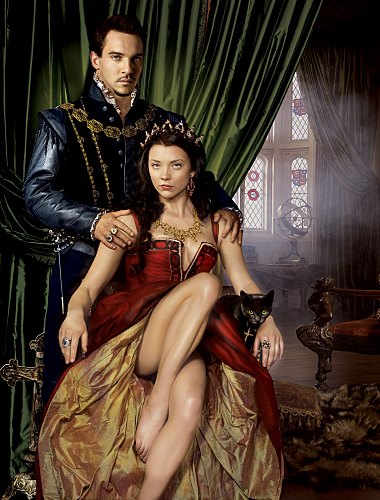 The Tudor period, and King Henry’s wives have been the focus of a lot of novels, movies and TV lately — some of it terrific stuff indeed.
The Tudor period, and King Henry’s wives have been the focus of a lot of novels, movies and TV lately — some of it terrific stuff indeed.
The Tudors was compulsive viewing, not just because of the costuming, in-your-face sex and titillation and the knife-edge lives those who dared played politics led in those days. The series was also historically spot on, and I really liked the way it portrayed Henry as a “modern” man for his age. He was a forward thinker, interested in all sorts of cutting-edge subjects. Science, philosophy, sociology. Henry had a huge influence on the shaping of England for the next century or so, and his daughter, Elizabeth, inherited his attitude and drive, and further moulded the country and empire.
But Henry’s modern thinking didn’t seem to extend to his wives.
While The Tudors and most other books and shows try to explain why, in reasonable terms, he executed Anne — and it was a convoluted and complex set of reasons, to be sure — ultimately it all seems to boil down to Henry having a hissy-fit because he wasn’t getting his way. Anne didn’t produce a son on demand. Everything else stems from that. He segregated the church of England from Rome so he could marry her after seven long years of courtship, and there were a lot of other church-and-state decisions he made that, broken down to their core, had very little to do with the organ sitting just under his skull.
Because Anne failed to give him the son and heir he wanted, Henry ordered Thomas Cromwell to find a way to get rid of her, as Henry had already moved on to Anne’s maid-in-waiting, Jane Seymour. Cromwell trumped up charges of witchcraft and adultery which, for a queen, meant high treason. High treason was an offence worthy of hanging, drawing and quartering. The four witnesses Cromwell pulled into the courtroom included Anne’s own brother, so the charges also implied incest. Three of the witness were high ranking peers, and therefore could not be tortured into giving a confession, and they adamantly insisted they were innnocent. The fourth was a commoner, and was forced into a confession in the court. It was a weak case against Anne, but it was upheld, and all four witnesses were found guilty and executed the day before Anne.
Henry rescinded the hanging, drawing and quartering, and ordered a “more merciful” beheading. And rather than allow the commoner’s axe be used, he had a French swordsman brought to London to do the deed. Under the circumstances, it seems a rather pathetic gesture, especially when Henry announced his engagement to Jane Seymour the same day Anne was executed.
Anne died 476 years ago today, on May 19, 1536. Her remains were left lying where they fell, and she was buried in an unmarked grave in the Chapel of St Peter ad Vincula. Her skeleton was identified during renovations of the chapel in the reign of Queen Victoria and Anne’s resting place is now marked in the marble floor.
It wasn’t until much later – centuries later — that historians established that Anne was actually innocent and the true extent of her influence on Henry and England was measured.
______________
When I was younger, I read a few Henry VIII books and of course the movie Anne of a Thousand Days, and Anne always seemed to have been the made the scapegoat, in fact most of Henry’s wives were due to not producing an heir. It always seemed so unfair to me, and of course, I liked Mary, Queen of Scots, another scapegoat.
I should look for some books since the ones I read were in the 70’s.
Hi Leilani:
One of the more successful books published recently is The Other Boleyn Girl by Phillipa Gregory, which was made into a movie of the same name starring Natalie Portman.
Cheers,
Tracy